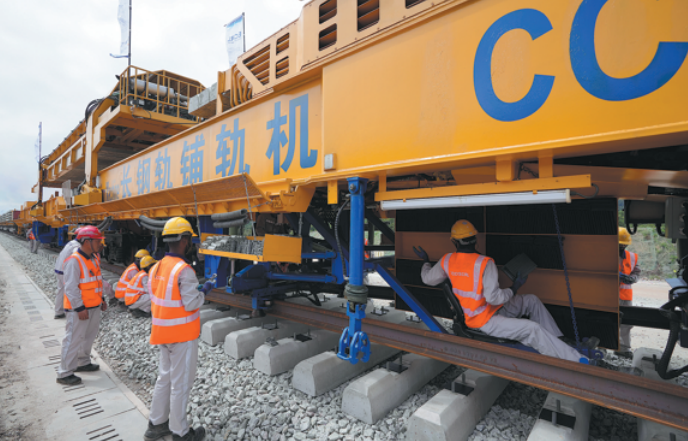Rail pact key to pan-Asian network vision

Workers lay down the first track for the East Coast Rail Link project in Gebeng, Pahang state, Malaysia, on Dec 11. VINCENT THIAN/AP
China's partnership with Malaysia is crucial not only to building the latter's key rail projects but also for the growth of a pan-Asian rail network, analysts say.
Peter Chang, deputy director of the Institute of China Studies at the University of Malaya in Kuala Lumpur, said the idea of a railway linking the west and east coasts of Peninsular Malaysia has been developing for many years.
"China's technological expertise is now making this vision a reality," Chang said.
On June 19 China's Premier Li Qiang and Malaysia's Prime Minister Anwar Ibrahim attended the groundbreaking ceremony of the East Coast Rail Link, held in the west coast state of Selangor as part of this year's celebrations of the 50th anniversary of bilateral relations.
The ECRL is a flagship project of China-Malaysia high-quality Belt and Road collaboration, Li said.
At the event, Anwar said Malaysia places high value on the relationship and collaboration between Malaysia Rail Link, which owns the ECRL, and China Communications Construction Company, its main contractor.
The ECRL could serve as a "vital component" of a broader railway network connecting Malaysia to Singapore in the south and Thailand in the north, as well as to China and the rest of Asia, Chang said.
Ong Kian Ming, pro vice-chancellor for external engagement at Taylor's University in Selangor state and Malaysia's former deputy minister for international trade, said there is one key challenge for the ECRL.
It is vital to ensure that it is financially sustainable "so that this infrastructure project won't be seen as a costly white elephant that does not bring about a significant increase in economic activity", he said.
The 665-kilometer rail network is expected to be operational by 2027. It will connect the east coast states of Kelantan, Terengganu and Pahang with the Klang Valley on Peninsular Malaysia's west coast.
The aim of the railway is to promote connectivity, boost economic development and promote trade and tourism in Malaysia's East Coast Economic Region, which accounts for more than half of the area of Peninsular Malaysia, but economic development in these states lags behind that of their counterparts on Malaysia's west coast, forcing residents to migrate for better job opportunities.
"The ECRL is crucial because it is designed to foster balanced development across Peninsular Malaysia," Chang said. "It aims to transfer the economic vibrancy of the Klang Valley on the west coast to the less developed states on the east coast."
Ong said the ECRL can foster economic growth in the East Coast Economic Region if industrial parks and manufacturing activity could be brought to some of the key stations along the route.
During last month's visit, Li said China is also willing to explore connecting the ECRL with the China-Laos Railway and the China-Thailand Railway to better promote the building of new international land and maritime trade routes and improve regional connectivity.
Greater convenience
An expanded rail network will sharply raise the convenience of passengers and cargo for these countries, analysts said.
As with the construction of the ECRL, the expansion of Pahang's Kuantan Port into a deepwater port to cater to bigger vessels and higher cargo traffic was among the major infrastructure projects under the master plan.
Mazlim Husin, chief commercial officer of Kuantan Port, said the ECRL's construction is "very positive" for the port because it would diversify transportation networks connected to the port.
The ECRL will not only develop the East Coast Economic Region but also improve connections between Malaysia and China via the port, Mazlim said.
Kuantan Port primarily serves cargo shipped between the Malaysia-China Kuantan Industrial Park and the China-Malaysia Qinzhou Industrial Park in Qinzhou, Guangxi Zhuang autonomous region, he said.
The two parks are part of the Two Countries, Twin Parks collaboration model involving China and Malaysia.
